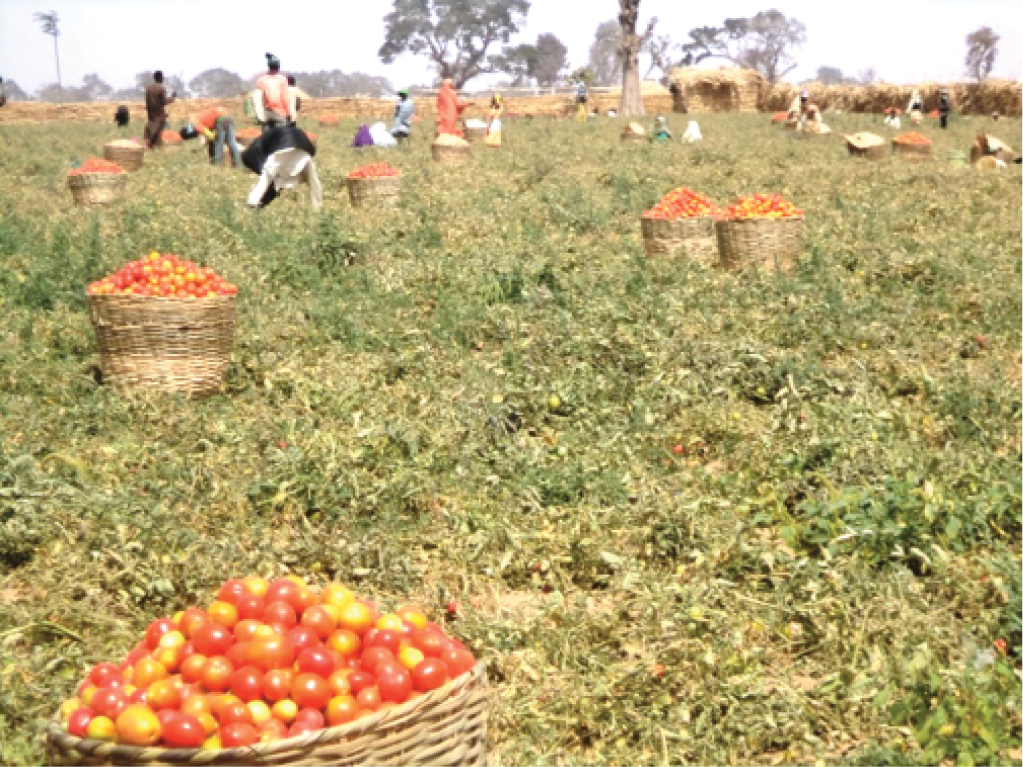Nigeria has a rapidly growing population of more than 200 million people, growing at about three percent a year. Despite the demographic boom, roughly half of Nigerians are living in extreme poverty. What is worse is that hunger and malnutrition have been on the rise in the country since the collapse of oil prices in 2014.
By 2019, the Global Hunger Index shows Nigeria ranking 93 out of 117 countries, with an unemployment rate of 23 percent. The situation is worsened by the COVID-19 pandemic which has caused huge shock to Nigeria’s economy and has led to rising joblessness and food insecurity in the country.
Nigeria’s agriculture sector has strong potential to provide adequate food for an increasing population, by supplying raw materials to a growing industrial sector, constituting the major source of employment in the country and being a major source of foreign exchange earnings.
However, the sector has not been able to live up to expectations due to a myriad of challenges such as inadequate budgetary allocation, low productivity, poorly developed value chain, farmers and herders crisis, general insecurity, climate-related disasters, and bad governance.
In 2014, Nigeria and other African countries came together to discuss many of the problems facing Africa’s food systems. In doing so, they agreed to a set of policy commitments to accelerate inclusive agricultural transformation on the continent, called the Malabo Declaration. Six years on, Nigeria is still not on track to achieving the Malabo goals. To address the gaps, ActionAid Nigeria (AAN), ONE Campaign, Federal Ministry of Finance, Budget and National Planning, Federal Ministry of Agriculture and Rural Development (FMARD) and the Department of Agriculture & Water Resources of the ECOWAS Commission organised a 2-day Stakeholders Consultative Meeting on the 2021 Agriculture Budget at Dover Hotel, Lagos State, 23rd – 24th September, 2020. The objectives of the meeting were: to leverage understanding on Nigeria Agriculture Promotion Policy (APP) and its connection to the Comprehensive Africa Agriculture Development Programme (CAADP) targets; to strengthen citizens’ participation towards making 2021 agriculture budget responsive towards food security and wealth creation; and to support effective biennial reporting by Nigeria to the African Union Heads of States in line with the Malabo Declaration and Commitments of 2014.
Participants which cut across government MDAs within the agriculture sector, Federal Ministry of Finance, Budget and National Planning; some State Ministries of Budget and Economic Planning as well as their Agriculture counterparts; Farmers’ Organizations; representatives of Small Scale Women Farmers Organisation in Nigeria (SWOFON); representatives of Association of Small-Scale Agro Producers in Nigeria (ASSAPIN); Media, Academia, Research & Finance Institutes; and other Civil Society Organisations (CSOs) and Youth NGOs/groups identified core issues to be addressed in the 2021 Agriculture budget. Top among the issues identified include: economic and post-harvest losses by smallholder farmers especially women as a result of COVID-19 lockdown across Nigeria; lack of access to credit by smallholder women farmers; non-compliance to the 10 percent national annual budget for agriculture as provided for in the Maputo/Malabo Declaration; inadequate and untimely release of budgeted funds for agricultural development; insufficient gender responsiveness of the agriculture budget, climate change and other agro ecological hazards; inadequate public information and participation in the whole budgeting process etc.
In addressing the issues raised, participants at the consultative meeting recommended that there should be political will to allocate at least 10 percent of annual budgets and actuals of revenues to the agriculture sector so that Nigeria will be on track in meeting its Malabo Declaration commitments of 2014. There is an urgent need for massive and unprecedented investment in the agriculture sector for domestic consumption, rural infrastructural development and export promotion. The 2021 budget for agriculture and rural development should be in conformity with the National Agriculture Investment Plan and the Medium-Term National Development Plan. The 2021 and subsequent years agriculture budget should be gender sensitive and responsive by providing line items for the implementation of the National Gender Policy in Agriculture that address specific challenges that affect women farmers different from men as well as avoid lumping up the budget for women farmers and other groups such as youths among many other recommendations.
As Nigeria takes steps to recover from the adverse impact of COVID-19 pandemic on its economy, it is important that the government prioritises transforming its food systems and agriculture sector. Youth and women-led agric-businesses should be supported with grants and their capacity developed. Modern farming machines and inputs should be made cheap, available and accessible. Building local resilience and adaptation strategies to climate change impact should be prioritised and funded while the government improves the general security situation in the country.
The public should be carried along in the phase by phase implementation of the 2021 budget to ensure transparency and accountability of the process and increase service delivery in the agric sector. With these actions, Nigeria would be poised to meet its Malabo declaration commitments of ending hunger and reducing poverty by half by 2025.
Daniel Onyedikachi Ugwu, Zannah Ismaila & Abdulkabir Omeiza Abdulmalik, ONE Campaign Youth Champions

 Join Daily Trust WhatsApp Community For Quick Access To News and Happenings Around You.
Join Daily Trust WhatsApp Community For Quick Access To News and Happenings Around You.


